I Don't Know How People Came To Think That "the Banality Of Evil" Means "evil People Are People Too".
I don't know how people came to think that "the banality of evil" means "evil people are people too".
That's also true but it's not what the banality of evil means.
The term was coined by Hannah Arendt in her report on the trial of Adolf Eichmann, the architect of the "final solution" in the Holocaust.
It describes the way in which the Nazis at large and Eichmann in particular have turned the horrendous act of mass murder into just another job, disconnecting themselves morally and emotionally from their actions.
Before the death camps and gas chambers, Nazi soldiers simply shot Jews into mass graves by the hundreds of thousands. It was a lot cheaper and faster, but it caused great psychological distress for the murderers who pulled the trigger.
The leadership's solution was a massively upscaled version of the "gas vans" they used to mass murder hundreds of thousands of Germans with disabilities and mental health issues.
Shooting bound civilians in point blank range over and over is something you can't just pretend you're not doing or is no big deal. But if you're just the guy who sorts people into groups. Or just the guy that funnels them into a room. Or just the guy who opens a cannister on the roof. It's much easier to distance yourself from what you know is happening.
The same principle applies to much lesser evils, like soldiers operating drones from a distance, or insurance workers denying coverage for life-saving treatment.
More Posts from Stackedcatsinatrenchcoat and Others
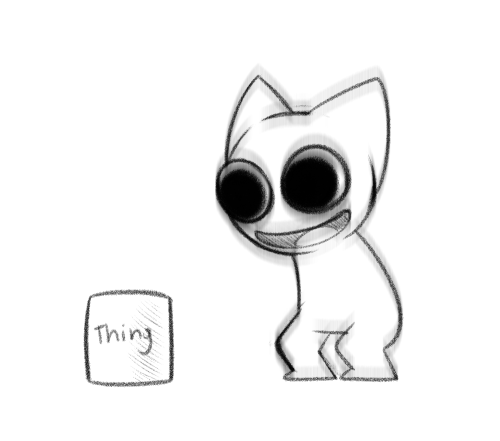
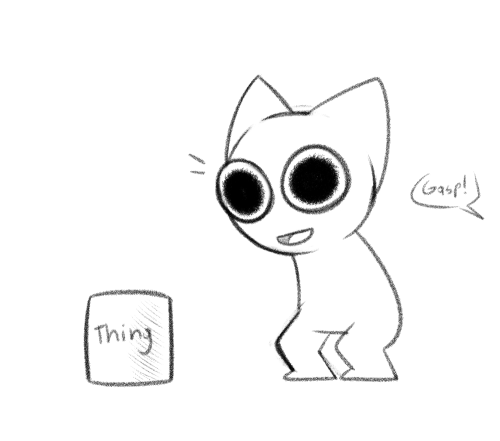
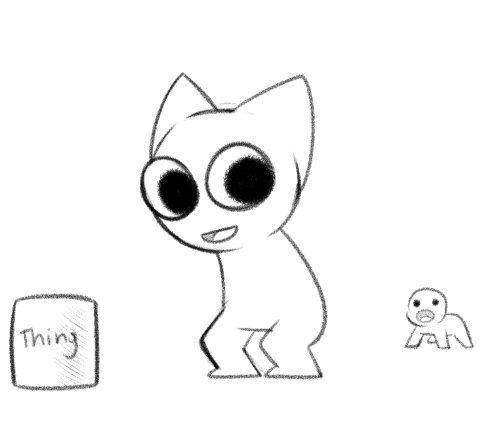
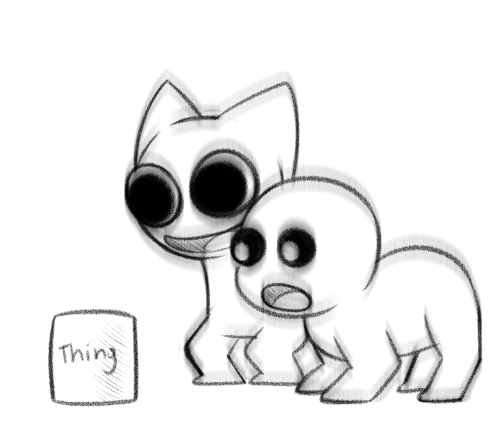
What if we hyperfixated together? 😗 JK JK… unless- 😏
By the way, you can improve your executive function. You can literally build it like a muscle.
Yes, even if you're neurodivergent. I don't have ADHD, but it is allegedly a thing with ADHD as well. And I am autistic, and after a bunch of nerve damage (severe enough that I was basically housebound for 6 months), I had to completely rebuild my ability to get my brain to Do Things from what felt like nearly scratch.
This is specifically from ADDitude magazine, so written specifically for ADHD (and while focused in large part on kids, also definitely includes adults and adult activities):
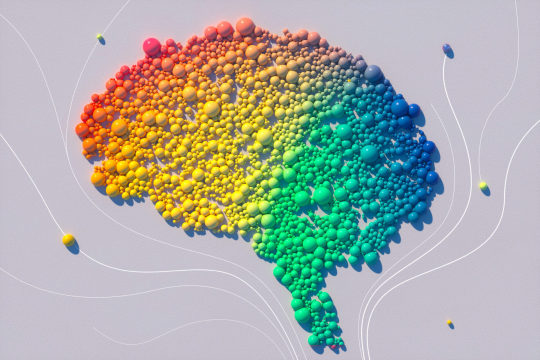
Here's a link on this for autism (though as an editor wow did that title need an editor lol):
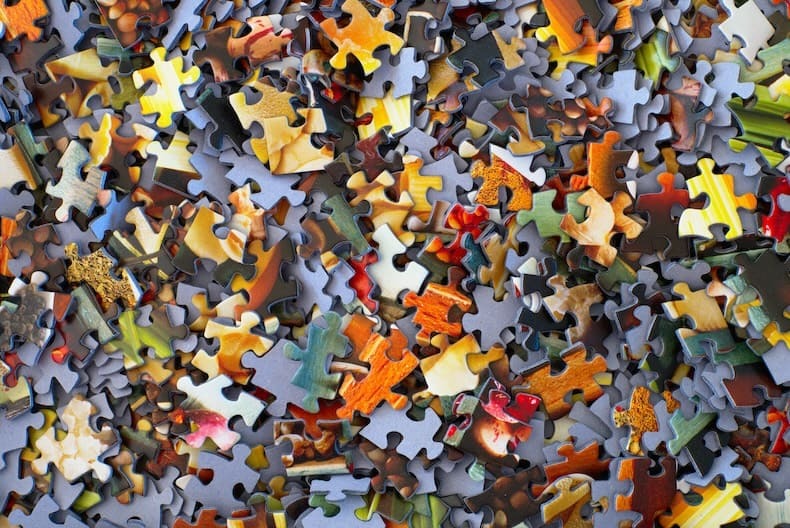
Resources on this aren't great because they're mainly aimed at neurotypical therapists or parents of neurdivergent children. There's worksheets you can do that help a lot too or thought work you can do to sort of build the neuro-infrastructure for tasks.
But a lot of the stuff is just like. fun. Pulling from both the first article and my own experience:
Play games or video games where you have to make a lot of decisions. Literally go make a ton of picrews or do online dress-up dolls if you like. It helped me.
Art, especially forms of art that require patience, planning ahead, or in contrast improvisation
Listening to longform storytelling without visuals, e.g. just listening regularly to audiobooks or narrative podcasts, etc.
Meditation
Martial arts
Sports in general
Board games like chess or Catan (I actually found a big list of what board games are good for building what executive functioning skills here)
Woodworking
Cooking
If you're bad at time management play games or video games with a bunch of timers
Things can be easier. You might always have a disability around this (I certainly always will), but it can be easier. You do not have to be this stuck forever.


This is Nakey, the sweetest lil corn snake!
This piece was incredibly challenging, but super rewarding as well! The scales shine differently as you move the hoop and they catch the light, creating shifting depth. I’ll upload another post with a vid showing that off cause it’s one of my favorite things about this, and the reason I chose to embroider each individual scale.
Image ID: A hand embroidered corn snake sits on an off-white muslin fabric inside an embroidery hoop. The snake has a pattern of red, orange and brown patches, bordered in dark brown. He is arranged in loops, one loop shows off his underbelly which is cream spotted with dark patches. He also has his tongue sticking out.
if your response to "diagnosed autistics in the US are having HIPPA violated to have their names put on a list by the government" is "so happy i was never diagnosed!"... then you are actually not helping in the slightest.
most of us with diagnoses were diagnosed as children, we didn't get a choice. and now we are getting put on a list, with those who are high support needs facing the most danger from said lists.
rubbing it in our faces that you won't be on said list is hurtful. its not funny. its not cute.

Autism is Not a disease
I think it needs to become common knowledge that "inability to read social cues" can show up as overcompensating.
You don't know how much misbehaviour is allowed, so you become the perfect child who never tests rules.
You don't know if someone is irritated with you, so you'll be extra generous and self-effacing.
You don't know how much is expected of you at work so you'll kill yourself in a minimum-wage job and not notice that nobody else is working like this.
"Hardworking and quiet" should be as much of an autism red flag as "ignores rules and doesn't know when to stop talking". Or why don't we just start using words to communicate so i can stop tracking everybody's eyebrow twitches, that would be great.

made another meme about my life. listening to this 6 times in a row now.
-
 maggots-in-the-veins liked this · 2 weeks ago
maggots-in-the-veins liked this · 2 weeks ago -
 in-the-drowning-deep reblogged this · 2 weeks ago
in-the-drowning-deep reblogged this · 2 weeks ago -
 completeellipse reblogged this · 3 weeks ago
completeellipse reblogged this · 3 weeks ago -
 completeellipse liked this · 3 weeks ago
completeellipse liked this · 3 weeks ago -
 zenpachii liked this · 3 weeks ago
zenpachii liked this · 3 weeks ago -
 cal7x reblogged this · 3 weeks ago
cal7x reblogged this · 3 weeks ago -
 cal7x liked this · 3 weeks ago
cal7x liked this · 3 weeks ago -
 songforaname reblogged this · 3 weeks ago
songforaname reblogged this · 3 weeks ago -
 youseiaoi reblogged this · 3 weeks ago
youseiaoi reblogged this · 3 weeks ago -
 rosie-b reblogged this · 3 weeks ago
rosie-b reblogged this · 3 weeks ago -
 sixthreblogsthe6th reblogged this · 3 weeks ago
sixthreblogsthe6th reblogged this · 3 weeks ago -
 mister13eyond liked this · 3 weeks ago
mister13eyond liked this · 3 weeks ago -
 masonhawthorne reblogged this · 3 weeks ago
masonhawthorne reblogged this · 3 weeks ago -
 husbandwoman reblogged this · 3 weeks ago
husbandwoman reblogged this · 3 weeks ago -
 meddlesomedragon reblogged this · 3 weeks ago
meddlesomedragon reblogged this · 3 weeks ago -
 see-yall-in-hell-mfs reblogged this · 3 weeks ago
see-yall-in-hell-mfs reblogged this · 3 weeks ago -
 see-yall-in-hell-mfs liked this · 3 weeks ago
see-yall-in-hell-mfs liked this · 3 weeks ago -
 lexissketches liked this · 3 weeks ago
lexissketches liked this · 3 weeks ago -
 vastlywillow reblogged this · 3 weeks ago
vastlywillow reblogged this · 3 weeks ago -
 headfullofflames liked this · 3 weeks ago
headfullofflames liked this · 3 weeks ago -
 fromfossils liked this · 3 weeks ago
fromfossils liked this · 3 weeks ago -
 totalitarianvegetables liked this · 3 weeks ago
totalitarianvegetables liked this · 3 weeks ago -
 dykemanticore liked this · 3 weeks ago
dykemanticore liked this · 3 weeks ago -
 p0tat0k1ng liked this · 3 weeks ago
p0tat0k1ng liked this · 3 weeks ago -
 jujunju reblogged this · 3 weeks ago
jujunju reblogged this · 3 weeks ago -
 gilmourtheapatosaur reblogged this · 3 weeks ago
gilmourtheapatosaur reblogged this · 3 weeks ago -
 averageapplepie reblogged this · 3 weeks ago
averageapplepie reblogged this · 3 weeks ago -
 unseelie-robynx reblogged this · 3 weeks ago
unseelie-robynx reblogged this · 3 weeks ago -
 sweetpeaalena liked this · 3 weeks ago
sweetpeaalena liked this · 3 weeks ago -
 klawl reblogged this · 3 weeks ago
klawl reblogged this · 3 weeks ago -
 stunt-muppet liked this · 3 weeks ago
stunt-muppet liked this · 3 weeks ago -
 janesaddictiontobatter reblogged this · 3 weeks ago
janesaddictiontobatter reblogged this · 3 weeks ago -
 janesaddictiontobatter liked this · 3 weeks ago
janesaddictiontobatter liked this · 3 weeks ago -
 swordsandboats liked this · 3 weeks ago
swordsandboats liked this · 3 weeks ago -
 deliriousfaol liked this · 3 weeks ago
deliriousfaol liked this · 3 weeks ago -
 wynterwulf7 liked this · 3 weeks ago
wynterwulf7 liked this · 3 weeks ago -
 doc-crab liked this · 3 weeks ago
doc-crab liked this · 3 weeks ago -
 cccrrrfu reblogged this · 3 weeks ago
cccrrrfu reblogged this · 3 weeks ago -
 apollotg liked this · 3 weeks ago
apollotg liked this · 3 weeks ago -
 hello-apes-of-the-world liked this · 3 weeks ago
hello-apes-of-the-world liked this · 3 weeks ago -
 mouldy-gremlin liked this · 3 weeks ago
mouldy-gremlin liked this · 3 weeks ago -
 magicspaceuncle reblogged this · 3 weeks ago
magicspaceuncle reblogged this · 3 weeks ago -
 magicspaceuncle liked this · 3 weeks ago
magicspaceuncle liked this · 3 weeks ago -
 serasays reblogged this · 3 weeks ago
serasays reblogged this · 3 weeks ago -
 serasays liked this · 3 weeks ago
serasays liked this · 3 weeks ago -
 fangirl-sunhawk liked this · 3 weeks ago
fangirl-sunhawk liked this · 3 weeks ago -
 theriverbeneaththeriver reblogged this · 3 weeks ago
theriverbeneaththeriver reblogged this · 3 weeks ago -
 galacta-phantasma reblogged this · 3 weeks ago
galacta-phantasma reblogged this · 3 weeks ago -
 deathcomes4u reblogged this · 3 weeks ago
deathcomes4u reblogged this · 3 weeks ago



